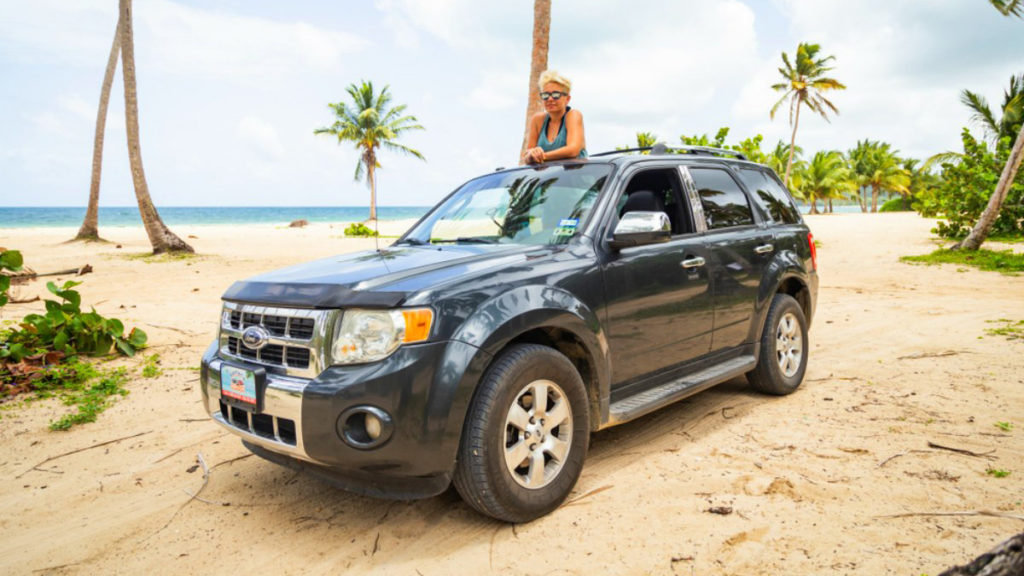Last Updated on January 23, 2023 by Kristin

Renting a car in the Dominican Republic? This picturesque nation occupies about two thirds of the Caribbean island of Hispaniola, with Haiti to the west. Having your own ride is a great way to explore the D.R.’s idyllic beach towns and 871 miles of coastline. However, driving in the D.R. is not for the faint of heart. Here are some considerations you should know about before planning your road trip.
Essential Tips for Renting a Car in the Dominican Republic
Book from home.
Waiting to book your reservation until you’re in the Dominican Republic will add more stress to your trip. In addition, you are almost guaranteed to pay more. Most major car rental companies allow free cancellations, so go ahead and book your trip from the U.S. ahead of time. The further ahead you reserve your car, the better the chance of landing a deal because you can watch out for price drops.
Ask AutoSlash for a Quote on a Cheap Car Rental
You do not need an International Driving Permit.
All you need is a valid state-issued driver’s license to rent a car in the D.R., but obtaining an International Driving Permit can be a good idea in this Spanish-speaking country. The document is easy to obtain and simply translates the information on your driver’s license.
Don’t drive into Haiti.
Most rental companies will not allow you to drive across the border into Haiti, and doing so could nullify any car rental insurance you purchase. If you do wanted to explore the other side of the island, it is important to double and triple check with your rental agency and get permission in writing, as additional conditions and fees may apply.
If you want to cross into Haiti, there are other ways to do so—such as on a bus or on an excursion tour. Don’t forget your passport.
Prepare yourself for the rules of the road.
In the Dominican Republic, you will drive on the right. Turning right on red lights is permitted, but it should be done with caution. Wearing a seat belt is mandatory in the Dominican Republic. Speed limits are in kilometers. Trucks have priority over cars.
Many travel blogs, forums and websites warn that driving in the Dominican Republic can be full of hazards, with mopeds, carts in the road and pedestrians requiring that drivers keep their full attention at all times.
There are many ways to ding up a rental car. Be careful at intersections. In some locations, culvets (deep indents in the road) replace stop signs. Drive over these very slowly to avoid damage to your rental car Speaking of which, be careful about getting off the beaten track. Major highways in the D.R. tend to be fairly smooth, but smaller roads, especially in rural areas,are often full of ruts and potholes and require careful driving.
Pay for the rental in Dominican pesos.
You may have the option to pay for the rental in U.S. dollars, but this option will cost you more in the long run. Pay in the local currency to avoid Dynamic Currency Conversion fees. If you opt to pay in U.S. dollars, the rental car company converts the purchase amount from the local currency on your behalf. But this process is entirely unnecessary, since your credit card company will process the transaction in either currency, and you will pay through the nose for the non-convenience.
Let AutoSlash Track Your Car Rental for Price Drops
Understand your insurance requirements.
The D.R. is one of those countries where it can be just easier to pony up for the insurance offered at the counter. It is very possible that your credit card will not cover you sufficiently when renting in the Dominican Republic (always check before you leave home), and the consequences of being underinsured in this country are particularly onerous.
If you are in an accident and underinsured, you can be jailed while the police sort out what happened. If that scares you, opt for a special type of insurance called the Casa del Conductore that can keep you out of jail in case of an accident. This is normally offered at the counter along with the collision insurance, but be sure to double check that it is part of the policy.
Expect a large security hold.
If your credit card covers you for overseas car rentals, you might plan to rely on that insurance in the Dominican Republic. Be aware, however, that if you decline the rental car company’s damage waiver, the company will typically hold a large security deposit against your credit card (often $1000 or more) while you are in possession of the vehicle.
Inspect the car carefully before you drive away.
While it’s tempting to head straight for the idyllic beaches upon picking up your vehicle, make sure to inspect the car extra carefully for any dings, dents or scratches on the surface. Take photos of every inch of the car. Otherwise, you could end up paying for those imperfections if you don’t document them before you leave.
Related:



